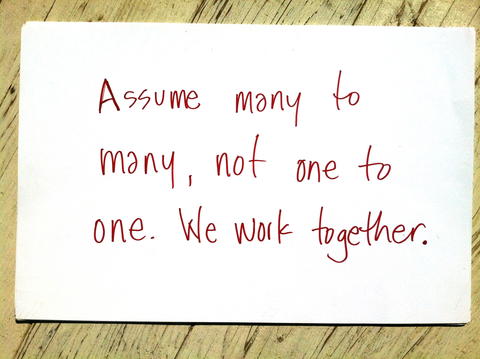We were born to share.
As we think about the glorious future of Upwell, we're talking to lots of people who have helped shape our path over the past two years. It's inspiring to see how abstract concepts have turned into daily practices, some measurable in graphs and some measured in far less 2D ways.
We're thinking a lot about sharing this week.

One of the posters we look at every day in the Upwell office.
Though we think about sharing and open access all the time, we haven't gathered those thoughts in one post. Here's a first draft of the Upwell Manifesto of Sharing.
- We're on the big Team Ocean. Ray, who has several national medals in rowing, confirms our position on the team is most similar to coxswain. We are happy to serve as the boat servant, and it feels accurate to say we're guiding navigation and steering, and encouraging our team members to work together and pull hard. This is a sports metaphor I get.
- Our work should be accessible to anyone in the sector. Though we can't fly around to everyone's office and personally do campaign consulting, we do it several times a week on the phone or by skype. To date, we do it for free. When we learn something that feels like an emergent best practice, we share it on our blog, and at every speaking opportunity. We also know that busy shark evangelists and social media managers don't have the luxury of digging through big reports and digesting graphs based on newly evolved methodologies. We try to make access both available and *possible* by quickly packaging the gems.
- This isn't our sandbox. We surface and test models to share. Awesome ocean communications were underway long before we arrived on the scene. We're grateful for that. Lots of people play in this sandbox.
- We curate best practices, too. And we bring them back from our hunts in the wild, tidily packaged, to big Team Ocean. Upworthy has done some amazing work in the past year. We didn't invent image macros. There are lots of good tactics about, but it's hard to know which are best.
- Whenever we can, we teach for free. In the last few months this has included workshops at the Greenpeace Digital Mobilisation Skill Share, SXSW Interactive (on Nonprofit Times, Beth Kanter's blog), NTC (upcoming), Personal Democracy Forum (upcoming), Web of Change, a recent meeting convened by Omidyar's Democracy Fund, and many more. Budgets are tight, so having travel covered really helps. We'll give up our weekends to teach for free. We believe the sector needs this knowledge that much.
- The ocean is our client. Part of what this means to us is that we should help support all of the orgs and evangelists who are helping make our client famous. We can't give money, but we can share skills and send attention.
- Sharing models makes them stronger. We can only do so much testing ourselves. Releasing models into the wild means we can get better, faster, if others test the models with us.
- We model an architecture of transparency. It doesn't help anyone for us to dump our files in the street. What does help is a considered, well-designed openness.
- Resources are abundant. We have everything we need to acchieve our conservation goals, we just need to get it into the right basket. Competition, siloes and secrecy slow progress.
- We've shared our work from the beginning. For a while we posted a soul-baring critique of every single campaign we did every single week. Ultimately, we dropped that practice because it didn't scale to produce narrative reports. We graph it now.
- The intern thinks we're exactly like a cleaner wrasse. Details to follow, upon further marine biology research.
- We choose appropriate licenses, and build sharing platforms. Getting the structure of sharing right matters. Hooray for foundation reports with Creative Commons licenses. And funders who respect sharing. And staff who breaks down a 160-page PDF into digestable blog posts - which we tweet about and go to lengths to cross-post.
I'm sure there are elements of our sharing that I've failed to record here. We'll be reflecting more on this and revising as we gain clarity. Speaking of which, why and how do you share?
Add a comment